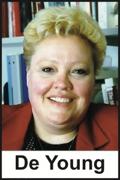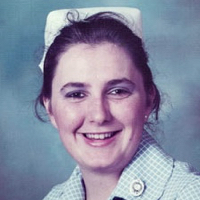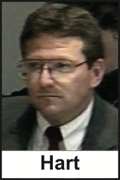Rascals case in brief
In the beginning, in 1989, more than 90 children at the Little Rascals Day Care Center in Edenton, North Carolina, accused a total of 20 adults with 429 instances of sexual abuse over a three-year period. It may have all begun with one parent’s complaint about punishment given her child.
Among the alleged perpetrators: the sheriff and mayor. But prosecutors would charge only Robin Byrum, Darlene Harris, Elizabeth “Betsy” Kelly, Robert “Bob” Kelly, Willard Scott Privott, Shelley Stone and Dawn Wilson – the Edenton 7.
Along with sodomy and beatings, allegations included a baby killed with a handgun, a child being hung upside down from a tree and being set on fire and countless other fantastic incidents involving spaceships, hot air balloons, pirate ships and trained sharks.
By the time prosecutors dropped the last charges in 1997, Little Rascals had become North Carolina’s longest and most costly criminal trial. Prosecutors kept defendants jailed in hopes at least one would turn against their supposed co-conspirators. Remarkably, none did. Another shameful record: Five defendants had to wait longer to face their accusers in court than anyone else in North Carolina history.
Between 1991 and 1997, Ofra Bikel produced three extraordinary episodes on the Little Rascals case for the PBS series “Frontline.” Although “Innocence Lost” did not deter prosecutors, it exposed their tactics and fostered nationwide skepticism and dismay.
With each passing year, the absurdity of the Little Rascals charges has become more obvious. But no admission of error has ever come from prosecutors, police, interviewers or parents. This site is devoted to the issues raised by this case.
On Facebook
Click for earlier Facebook posts archived on this site
Click to go to
Today’s random selection from the Little Rascals Day Care archives….
Click for earlier Facebook posts archived on this site
Click to go to
Today’s random selection from the Little Rascals Day Care archives….
‘Parent-experts’ found meaning where there was none
 April 6, 2012
April 6, 2012
“Parent-experts made a specific kind of sense of their children’s behaviors and emotions by retrospectively interpreting them as sequelae of day care ritual abuse rather than as reactions to familial stress, the vicissitudes of growing up or, for that matter, the stress of the investigation and the interrogations. ….
“Parent-experts testified that they never had reason to worry about their children’s behavior until they disclosed ritual abuse. Then, to the parent-experts, the tantrums, fears and sleep disturbances that once had looked like nothing more than normal growing pains were retrospectively interpreted….”
– From “The Day Care Ritual Abuse Moral Panic” by Mary De Young (2004)
Judge Marsh McLelland’s allowing parents to testify as experts about their children’s behavior was one of the key defects pointed out by the N.C. Court of Appeals in overturning the convictions of Bob Kelly and Dawn Wilson.
Latest site of ‘ritual abuse’ claims: Scotland

theguardian.com
Carole Myers/Felstead
March 21, 2016
“Once again advocates of the much discredited Satanic Abuse Panic are making claims of widespread child abuse across Britain.
“Scotland appears to have become caught up in a nationwide frenzy of superstitious irrationality. This moral panic exhibits typical clichés of sensationalist psychology. In England, the case of Carole Myers/Felstead – whose family were falsely accused of an endless variety of insane criminal acts – has comprehensively demonstrated that the existence of Satanic Cults preying on vulnerable children is a myth created on the therapist’s couch…. Real victims of abuse are being let down by focusing on this nonsense.”
– From “Recent Satanic Abuse Claims in Scotland” by the British False Memory Society (March 10)
For whatever reason, the UK seems especially resistant to having its fingers pried from the myth of “satanic ritual abuse,” which migrated from the States in the late ’80s.
![]()
Prosecutors’ motto: But they’re still guilty!
Jan. 20, 2012
Although the West Memphis Three weren’t day care workers, their notorious case – most recently updated in HBO’s “Paradise Lost 3: Purgatory” – holds obvious parallels to that of the Edenton 7.
In both courtrooms voodoo justice ruled.
Most poignant to me, however, is that prosecutors in Arkansas and North Carolina shared a dedication to ensuring the defendants’ long-overdue release bore the least possible resemblance to exoneration.
In August 2011 the West Memphis Three were required to enter an Alford plea, maintaining their innocence but acknowledging that sufficient evidence existed to convict them.
On May 23, 1997, Nancy Lamb announced the decision not to challenge the overturned convictions of Bob Kelly and Dawn Wilson in order to “allow wounds to heal…. The paramount thing is not having to drag these children through this again.” Her timing seemed aimed – futilely, as it turned out – at averting the national outrage that would come four days later with the airing of the final episode of “Innocence Lost.”
Two years later, when the last charges against Kelly were dismissed, here’s how Joseph Neff of the News & Observer described the scene:
“The prosecutors in the longest, most expensive criminal case in North Carolina history picked a day when all attention was focused elsewhere to quietly throw in the towel.
“It was Sept. 15, as Hurricane Floyd churned northward toward landfall the next day, that Assistant District Attorney Nancy Lamb filed a two-page document with the Clerk of Superior Court in Edenton, dismissing eight counts of sexual abuse against Robert Kelly.”
Bill Hart used day-care moms as dating pool
 Aug. 6, 2012
Aug. 6, 2012
Let’s say you were a special deputy attorney general called in from Raleigh to help prosecute the Little Rascals case. Now imagine: What would be the most inappropriate, the most ethically questionable way you could possibly spend your spare time in Edenton? How about starting to date the mother of one of the alleged victims?
Yes, that’s exactly what Bill Hart chose to do. He and Patricia A. Kephart had been involved for months even before Bob Kelly’s trial began.
Readers of this blog won’t be surprised to learn that Hart denied any impropriety and blamed the defense for trying “to divert attention from the case.”
But Rich Rosen, professor of criminal procedure at the UNC Chapel Hill School of Law, told the News & Observer of Raleigh (Dec. 20, 1991) that “It certainly raises questions in my mind. A prosecutor is not supposed to have any personal involvement or interest in the case.”
One question raised in my own mind: Unlikely, yes, but what if Hart had experienced a pang of doubt about the validity of the prosecution’s case? Would he have been able to admit that to his girlfriend (much less to his fellow prosecutors)?
At the conclusion of the state’s case, prosecutors dropped charges related to Kephart’s daughter. Hart and Kephart later married.











0 CommentsComment on Facebook